Privacy and confidentiality
Privacy is a crucial element of our personal security, enabling free speech and democratic participation. The absolute and fundamental human right to privacy guarantees people respect for their private life and freedom from snooping and unlawful interference. It gives everyone the freedom to be themselves, to express and develop their opinions and ideas with dignity, and to practice their religion, as well as giving journalists and civil society the ability to report on violations of rights by states or businesses. Without sufficient privacy, people’s private interactions are exposed, which can be used to target or discriminate against them.
Filter resources
-

ECtHR gives a half-hearted victory against UK mass surveillance
On 13 September 2018, the European Court of Human Rights (ECtHR) delivered its ruling on the case brought by EDRi members Privacy International, Open Rights Group and other NGOs against the United Kingdom. The Court found several violations of the European Convention on Human Rights in three UK mass surveillance programmes. The Court’s judgment is […]
Read more
-

Five reasons to be concerned about the Council ePrivacy draft
The amendments improve the original proposal by strengthening confidentiality requirements for electronic communication services, and include a ban on tracking walls, legally binding signals for giving or refusing consent to online tracking, and privacy by design requirements for web browsers and apps.
Read more
-
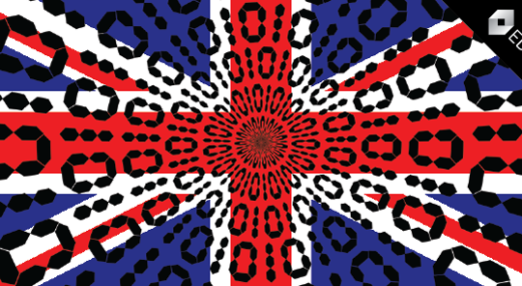
UK counter-terrorism law would restrict freedom of expression
Freedom of expression campaigners, human rights groups and legal experts are raising concerns that proposed new counter-terrorism legislation in the United Kingdom would restrict freedom of expression and limit access to information online.
Read more
-

Big Brother Awards 2018 Italy
The 2018 Italian edition of the Big Brother Awards was held in Bologna on 8 June 2018, with the support of a grant from the European Digital Rights Fund. The award ceremony took place during the 23rd edition of the E-privacy conference.
Read more
-

How the online tracking industry “informs” policy makers
Following the entry into force of the General Data Protection Regulation (GDPR), the online advertising industry’s lobbying efforts moved to undermining the ePrivacy Regulation proposal.
Read more
-

US companies to implement better privacy for website browsing
Important changes are underway for web users, as browser manufacturers are set to put domain name system (DNS) look ups in the hands of more predictable, trusted and transparent sources.
Read more
-

EU Council considers undermining ePrivacy
On 19 October 2017, the European Parliament’s LIBE Committee adopted its report on the ePrivacy Regulation.
Read more
-
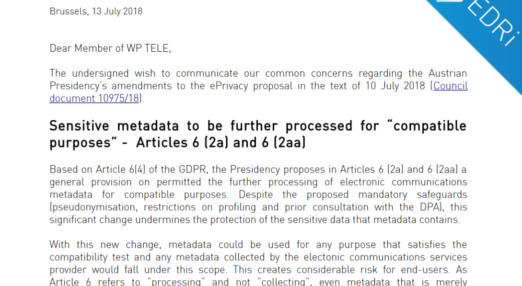
Civil society calls for the protection of privacy in ePrivacy
On the 13th of July, EDRi, together with Privacy International, IT-Politisk Forening and Access Now sent a letter to the TELE Working Party of the EU Council regarding the dangers for privacy protections associated with the latest proposals brought forward by the Austrian Council Presidency. The letter comments the developments and argues that such changes […]
Read more
-

Civil society calls for protection of communications confidentiality
On 31 May EDRi, Access Now, and Privacy International met attachés to the EU Council (representatives of EU Member States) who work on the ePrivacy Regulation proposal.
Read more
-
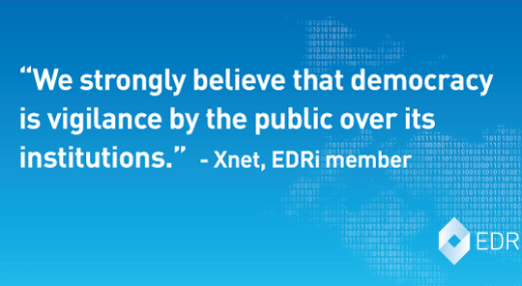
Xnet: Opposing guarded access to institutional information
Xnet brought up questions about the compliance of the Spanish Data Protection Agency's work with the new Data Protection Regulation.
Read more
-
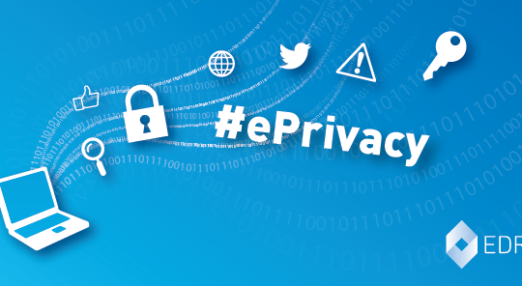
Your ePrivacy is nobody else’s business
The right to privacy is a fundamental right for every individual, enshrined in international human rights treaties. This right is being particularly threatened by political and economic interests, which are having a deep impact on freedom of expression, democratic participation and personal security.
Read more
-
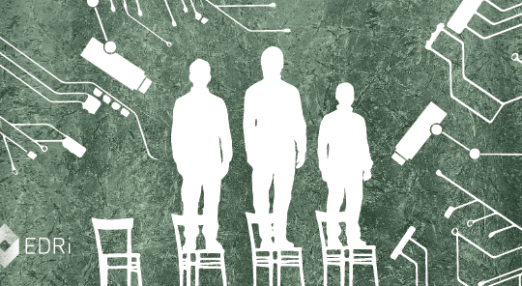
Gesellschaft für Freiheitsrechte: Legal challenge against Bavarian Police Act
EDRi observer Gesellschaft für Freiheitsrechte (GFF) is preparing a joint constitutional complaint to be brought before the German Constitutional Court against the newly passed Bavarian Police Act (PAG)
Read more
